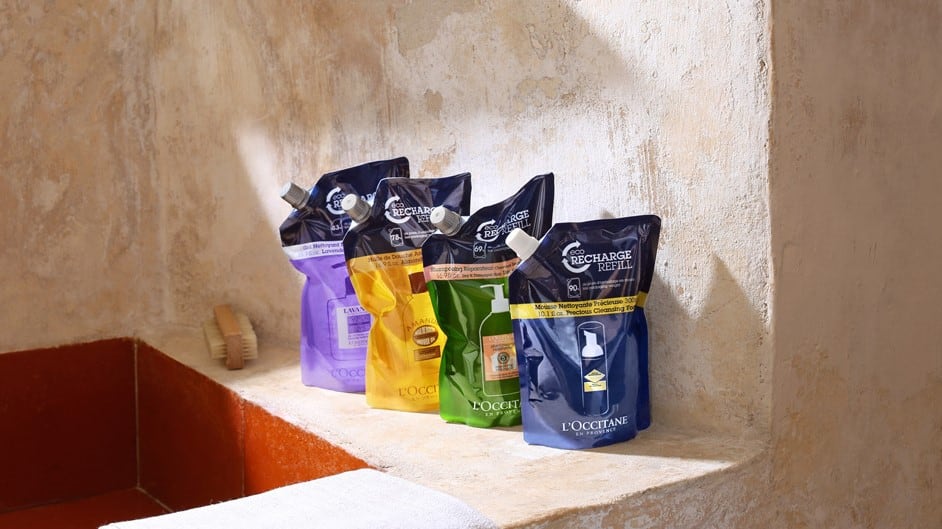The French cosmetics company, which counts the beauty brands L'Occitane en Provence, Erborian and Melvita as part of its portfolio, will incorporate Loop PET plastic into L’Occitane en Provence packaging from 2022 and include the Loop logo on its packaging.
World without plastic
This will enable the brand to have fully sustainable packaging by 2025. Currently, recycled plastic only takes up 30% of the brand’s packaging.
“Our brand is inspired by nature, people and culture and we have been using natural plant-derived ingredients and eco-friendly manufacturing for more than 40 years. We are therefore very conscious of the importance of eco-design and sustainable packaging.” said the company in a statement.
To further extend its efforts, L’Occitane reveals that its goal is to provide in-store recycling facilities in all its stores globally to encourage its consumers to play an active role in recycling.
It is a project the firm has been working on since 2014 with TerraCycle. Currently, 30% of its owned stores across the world provide the service and the company aims to reach 100% by 2025.
Raphaelle Archambeaud-Sicot, Sustainable Development Director for the L’Occitane Group told CosmeticsDesign-Asia that the company is definitely seeing demand for such initiatives in Asia.
“We are seeing an increasing demand for these, especially in some countries. However, we are not waiting for this and we want to be proactive and propose solutions in every market in the future.”
The company just launched in-store recycling in all its 144 stores in Japan and 23 stores in Hong Kong to positive response.
“There has been positive feedback from customers. Our current customers commented that they have been waiting for such a program. Several customers brought back as many as 10 bottles during first month of launch,” commented Archambeaud-Sicot.
Additionally, the company just ended its three-month trial in South Korea. The trial saw participation of around 4,000 customers.
“This exceeded our expectations and anticipated participation rate. We will therefore be starting an annual program as of April 2019,” said Archambeaud-Sicot.
“The L’Occitane Group has always been very conscious of the impact of packaging and the fundamental importance of eco-design and recycling. With nature at the heart of its business, the group is committed to limiting its impact on the environment at every possible step, from product formulation and sustainable packaging through to final product distribution,” said the company.
L’Occitane en Provence currently has 15 eco-refill products, which were introduced in 2008. According to the company, this allows it to use up to 90% less packaging.
In 2018, it represented a saving of 121 tonnes and lowered CO2 emissions as it reduced product transport.
It added: “The group is working with specialised suppliers to design lighter packaging that prioritises recycled materials, and aims to increase its current 84% technically recyclable plastic in its bottles to 100% by 2025.”
Tech meets environmental savvy
Loop’s patented and proprietary transformational upcycling technology takes unwanted materials like damaged ocean plastics and polyester textiles in any colour, transparency or condition to create food-grade packaging that meets FDA requirements.
“The innovative technology that Loop provides is a game-changer that can help us fundamentally contribute to solving the growing global concern about plastic pollution. We are excited to sign with Loop, representing a significant shift in our approach to plastic,” said Adrien Geiger, global brand director of L’Occitane en Provence.
“Helping companies leverage their packaging as a symbol of their commitment to sustainability rather than a symbol of waste is one of our primary missions,” added Daniel Solomita, founder and CEO of Loop Industries.
“We are so pleased to work with the L’OCCITANE Group, a leading premium retail brand, to do just that. We are convinced that companies that make this transition, use sustainable packaging and encourage recycling, will help restore our environment and create greater economic value.”
Beauty firms band together
L’Occitane is not the only cosmetics company that is doubling down on its sustainability and recycling efforts.
Last month, Personal care giant P&G was one of the companies that pledged more than $1bn to The Alliance to End Plastic Waste (AEPW), which is aimed at eliminating plastic waste in the environment.
In the same month, Cosmetics company LUSH announced that it plans to open its first packaging-free store in the UK after the success of the ‘Naked’ stores in Milan and Berlin.
Since 2016, Japanese company Kao Corporation has been engaging in the social implementation its RecyCreation projects. For this social and environmental initiative, Kao works with local communities to collect used refill packs and send them to be recycled into polymers.


